Peter Mason’s foreword to Ealing Council’s 2023-2027 Land and Property Strategy [pdf] promises to “retain assets for maximum resident benefit.” It’s a reassuring commitment from the council leader who styles himself as protector of public services.
But scroll through Mason’s 26 page document, and you’ll find the reality: 760+ community assets across Ealing marked for “strategic review” - the euphemism that precedes disposal. The strategy reads like a corporate restructuring plan dressed up as community empowerment.
The strategy isn’t the beginning of Ealing’s asset stripping programme - it’s the public admission that the programme has been running systematically for almost two decades.
The Dominion Centre Template: New Labour’s Greatest Hit
The blueprint was established in 2007 with Southall’s Dominion Centre - where Ealing Labour’s genocide supporters now pose for their group photos. The original Southall library was closed and the Dominion community centre “repurposed” into this shiny multi-service hub that offers library services alongside “study areas, exhibition space, community centre facilities, public computers, free WiFi, and service advisors for council enquiries.”
It was perfect New Labour thinking: consolidate services, cut costs, and rebrand the reduction as “modernisation.” The Dominion Centre became the template for what the 2023 strategy now calls “one-stop community hubs” - the model being rolled out to replace purpose-built facilities across the borough.
This is where Mason’s true inspiration comes. In January 2014, he posted a photo of Tony Blair’s 1994 “Change and National Renewal” manifesto, adding: “Its content is as true now as it was 20 (yes, 20) years ago #tony.” That Blair document became the blueprint for New Labour’s PFI (private finance initiative) obsession - and Mason has been implementing its asset disposal philosophy ever since.
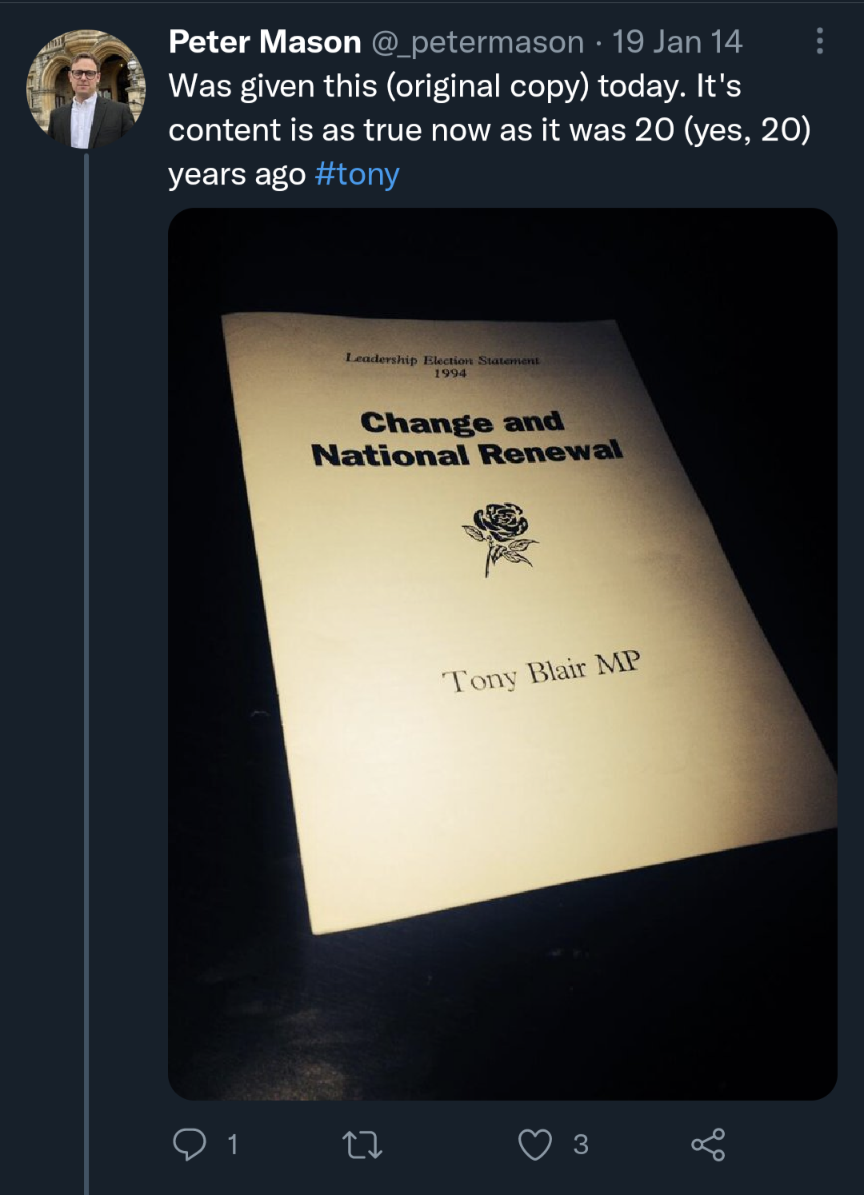 —
—
This was Thatcherism enacted by Ealing’s own fanboy of Thatcher’s greatest achievement, Tony Blair. Public assets re-conceptualised as “underutilised resources” requiring “optimisation.” The Dominion Centre pioneered the PFI dogma that would define New Labour: why provide dedicated public services when you can cram everything into one building, call it efficiency, and sell off the valuable bits?
Mason, himself a town planner, has perfected this model beyond Blair’s (and Thatcher’s) wildest dreams. Under his and his mentor and predecessor Julian Bell’s leadership and direction, Ealing Labour has systematically disposed of or attempted to sell off libraries, children’s centres, leisure centres, community golf courses, nature reserves, football and cricket pitches, town halls, community centres, and youth centres. It’s PFI without the private finance - just the asset stripping.
The 2011 Monopoly Meeting: Developers Set the Agenda
By 2011, the programme was ready for acceleration. My investigation into the “Ealing Monopoly” meeting revealed unelected businessmen mapping out the systematic disposal of £20 million worth of public assets. Berkeley Group’s Tony Pidgley advocated a “don’t waste a good crisis” approach (later echoed by Julian Bell with regard to covid and implementing low traffic neighbourhoods) to public asset disposal, targeting “buildings used for services for vulnerable adults, children and families.”
The same Tony Pidgley who later boasted to a meeting with residents at the height of the Southall Gasworks poisoning scandal that he could “phone Julian [Bell]” and tell him “to put a councillor on it”.
The meeting wasn’t secret - it was just conducted in the language of management consultancy that residents couldn’t decode. They discussed “strategic asset review,” “portfolio optimisation,” and “community empowerment” - the same euphemisms that now fill the 2023 strategy document.
What’s remarkable about the 2011 document is how precisely it predicted what’s happening now: Victoria Hall bundled into hotel developments, children’s centres facing closure, community assets transferred to “community ownership” (meaning communities pay maintenance costs while losing democratic control).
Here’s long-time community activist and defender of local democracy Eric Leach explaining the sheer insanity of Ealing Council’s position on their attempted sale of public heritage asset Victoria Hall. It’s so bad, a high court judge had to intervene.
The Strategy Document: Making It Official
The 2023 strategy transforms thirteen years of ad hoc disposals into official policy. It establishes a “corporate landlord model” that centralises control over all assets, removing departmental protection that might preserve community facilities.
The document’s genius lies in its presentation: every disposal is reframed as “community empowerment.” Closing children’s centres becomes “empowering communities to own and manage spaces.” Selling off Victoria Hall becomes “optimising heritage assets.” Cramming multiple services into inadequate spaces becomes “creating inclusive hubs.”
Mason’s leadership allows him to be simultaneously the protector of services and the person implementing their systematic disposal - a remarkable administrative innovation worthy of his New Labour pedigree.
The Children’s Centres Madness: Libraries and Faith Centres as Nurseries
The strategy document’s euphemisms become even more absurd when applied to children’s centres. Ealing proposes to “improve” services for under-fives by closing purpose-built, award-winning facilities and relocating services to libraries and faith centres.
As I documented in the children’s centres campaign, this means expecting toddlers to attend sessions in overcrowded libraries where “small children like to make a lot of noise and run around” next to people trying to read. Or pushing mainly female service users into “highly patriarchal” religious venues “not known for confidentiality, and not designed for children’s safe and secure play and development.”
The strategy presents this as “empowering communities to own and manage spaces” while the council sells off the purpose-built, safe, inclusive buildings that actually work. It’s the perfect inversion of public service logic: destroy what works, replace it with what doesn’t, then claim you’re “improving” services.
The Pay Rise Principle —
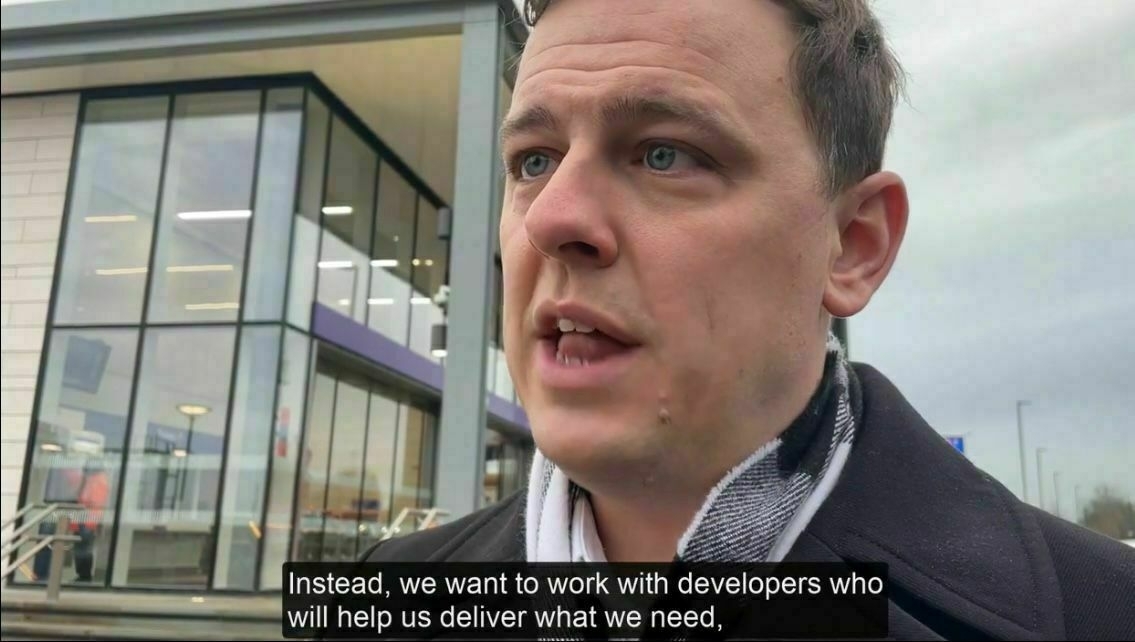 ---
---
But perhaps Mason’s most revealing statement comes in a video where he promises to “work with developers who will help us deliver what we need.” What Mason needs, it turns out, is substantial personal enrichment. His Special Responsibility Allowance rose from £32,100 to £54,860 - a 70.9% increase that brought his total council remuneration to £66,874.
The Victoria Hall Test Case
Victoria Hall represents the perfect test case for this systematic programme. Eric Leach’s legal challenge has exposed the governance failures that enable it: councils acting as “sole trustee” approving their own asset disposals, rubber-stamp committees with no real power, and qualified community candidates ignored when they apply to join oversight bodies.
The £120,000 the Friends of Victoria Hall have raised for legal challenges represents communities learning to build the independent power necessary to challenge predetermined outcomes disguised as consultation.
But Victoria Hall was never an isolated case. It’s the implementation of a plan mapped out by developers in 2011, trialled with the Dominion Centre in 2007, and now formalised in the 2023 strategy that targets 760+ assets across Ealing.
“People Before Buildings”: The Perfect Slogan —
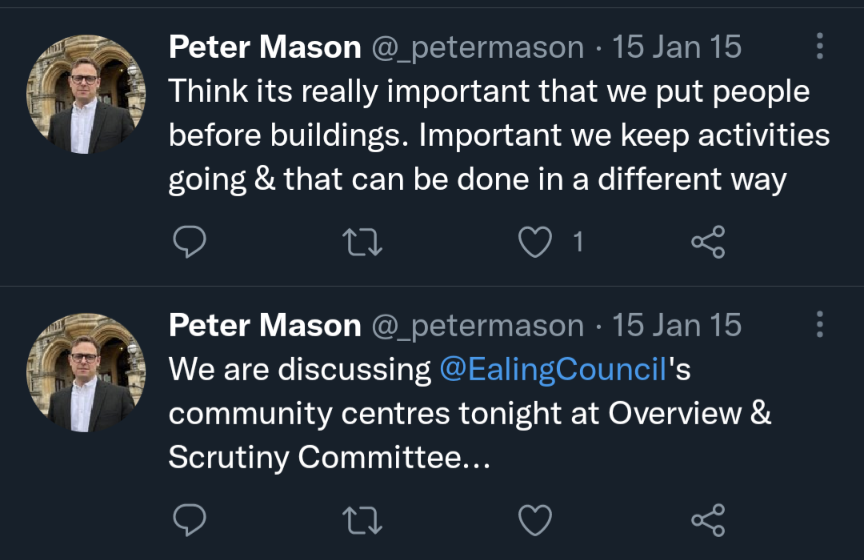
Mason’s genius lies in his messaging consistency and ideological clarity. On January 15, 2015, he tweeted: “Think its really important that we put people before buildings. Important we keep activities going & that can be done in a different way.”
It’s the perfect slogan for systematic asset disposal. Why preserve purpose-built children’s centres when you can relocate services to overcrowded libraries and faith centres? Why keep Victoria Hall when you can bundle it into a hotel development? The activities continue - just in worse conditions, with reduced access, serving fewer people.
“People before buildings” becomes the rhetorical cover for disposing of the buildings where people access services. It transforms every closure into an act of progressive politics. Mason has been refining this argument for a decade, and the 2023 strategy represents its ultimate expression: 760+ assets under “review” while claiming to prioritise community needs.
The MIPIM Pipeline: From Bell to Mason
The systematic disposal becomes more sinister when connected to the £33,000+ in “gifts” and MIPIM conference attendance that Mason and his predecessor Julian Bell accepted from developers, including Berkeley Group.
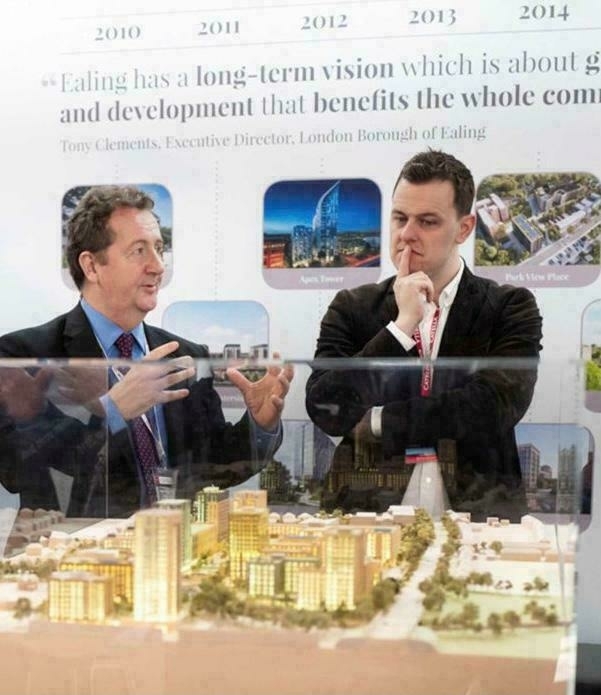 ---
---
The visual evidence tells the story perfectly. At property conferences, Mason sits listening intently as Bell explains developer’s “long-term vision” - not for residents, but for profitable disposal.
 ---
---
Elsewhere, Mason and Bell enjoy a pint together down the local pub, the mentor passing on his expertise to the protégé. At MIPIM-style events, they share champagne and development plans with property interests.
When Berkeley Group literally sponsors council events with “PROUDLY SPONSORED BY Berkeley” branding, the capture becomes complete.
 ---
---
When your town planner council leader and his mentor take developer hospitality while disposing of community assets, the conflicts of interest become embedded in the planning system itself.
Democracy 2.0: Now With Less Democracy
The system’s crowning achievement is happening right now. In July 2025, Ealing Council rewrote petition rules in direct response to successful community campaigns, removing residents' rights to ask follow-up questions and requirements for senior officers to give evidence.
They’ve solved the democracy problem by removing the democratic bits from democracy. It’s the perfect complement to an asset disposal programme that operates through consultation theatre - predetermined outcomes with participation facades.
The Bigger Picture
What Ealing’s 18-year asset disposal programme reveals isn’t just local government corruption - it’s the systematic implementation of neoliberal ideology through administrative process. The Dominion Centre model of 2007 has become the “community hub” euphemism of 2023, turning public assets into “underutilised resources” requiring “optimisation.”
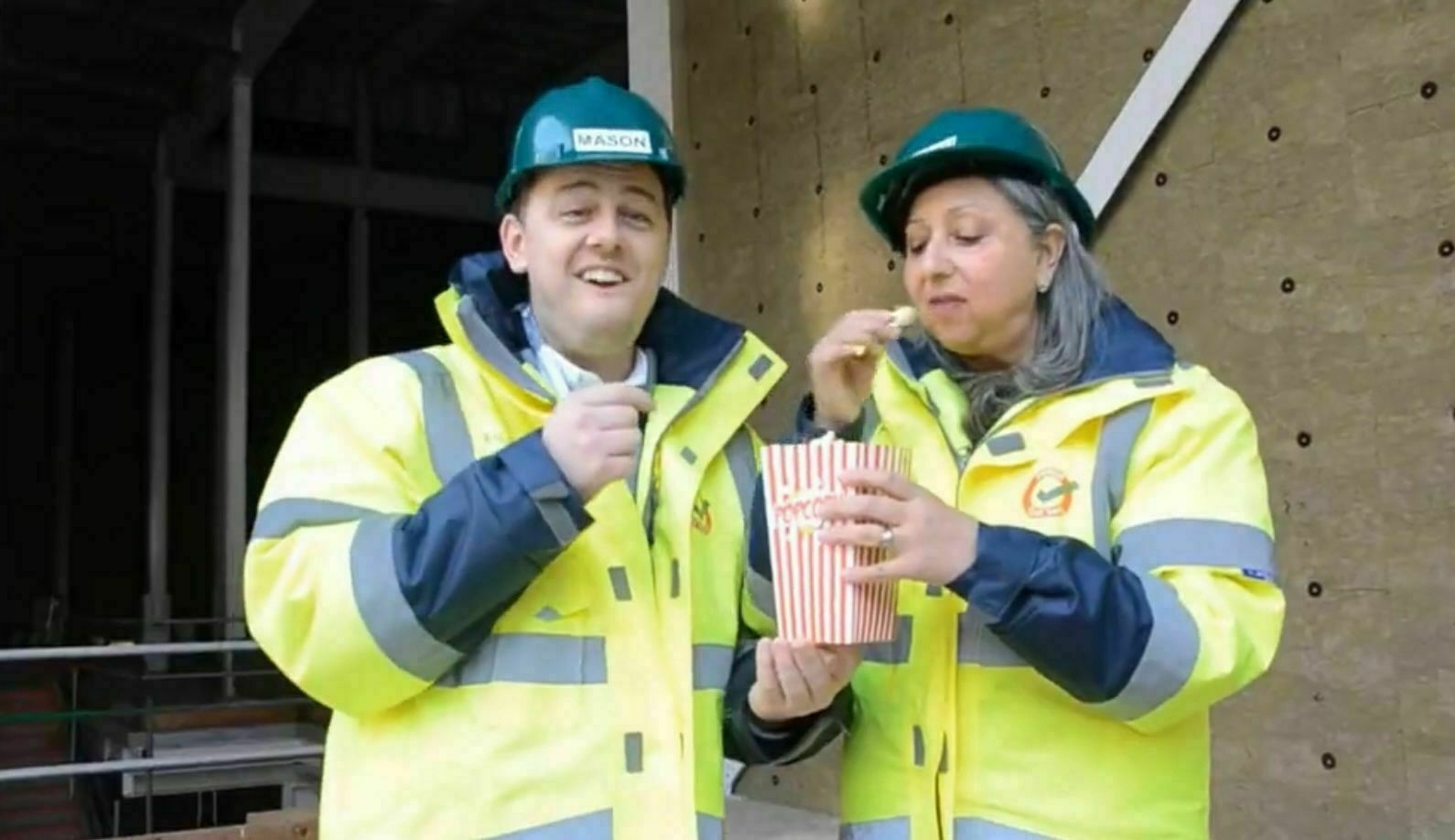
The 2011 developers' wish-list has become official council strategy. The governance failures Eric Leach exposed around Victoria Hall operate across every aspect of the programme. Mason’s 70.9% pay rise and the £1m+ cost of his and councillor allowances increases while closing half of Ealing’s Children’s Centres to save a few hundred thousand pounds shows exactly whose side Ealing Labour are on. And it isn’t ours!
It’s Thatcherism with a human face - and that face belongs to Peter Mason, the New Labour politician who learned to speak her language fluently while pretending to oppose her legacy.
 —
—
The Victoria Hall campaign continues. The legal challenge proceeds. The 760+ assets remain under “strategic review.” And the machinery of systematic disposal, finally revealed in the 2023 strategy document, operates in plain sight - hidden only by the euphemistic language that transforms asset stripping into community empowerment.
Key Documents:
- Ealing Council 2023-2027 Land and Property Strategy
- 2011 “Monopoly meeting” exposé
- Victoria Hall legal challenge
- July 2025 petition rule changes
Follow this story and more with a free subscription: southallstories.uk

